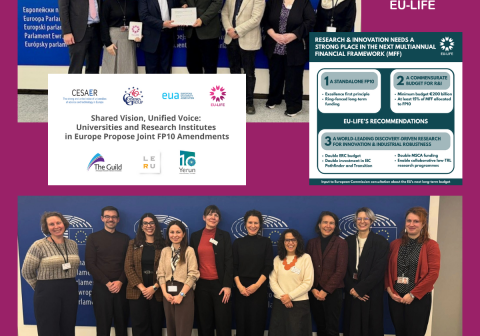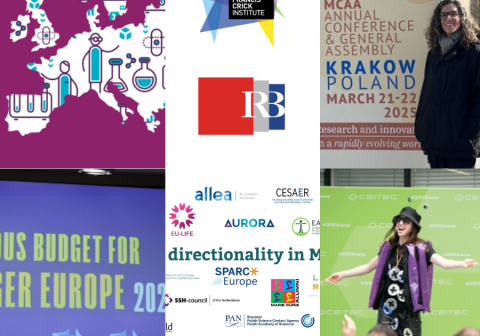Women in EU-LIFE: Natalia Szulc, PhD Student at IIMCB

Could you tell us a bit about your research?
I study the evolutionary adaptation of the proteome to regulation by the ubiquitinproteasome system - a proteolytic pathway responsible for degrading damaged or unwanted proteins that plays a key role in maintaining cellular homeostasis. I am particularly interested in the turnover of proteins with very few lysines, which are canonical tagging sites for ubiquitin, whose attachment often leads to protein degradation. I hope that my research will contribute to the development of strategies for the targeted degradation of lysine-free proteins involved in pathogenic processes. I also explore the evolutionary conservation and specificity of degrons, the short linear motifs by which proteins are recognized and then targeted for degradation, as well as mutations occurring within degrons that can lead, for example, to protein aggregation in neurodegenerative diseases. My research combines high-throughput experimental techniques with data analysis, software development, and machine learning.
Could you take us back to the beginning of your scientific career? What got you interested in this field?
I have always been fascinated by living systems and how science can bring us closerto their comprehensive understanding. Since my undergraduate studies - I earned two MSc degrees, in molecular biotechnology and computational engineering - I have been interested in conducting interdisciplinary research, combining multiple techniques and with a strong focus on human metabolism. Therefore, during my PhD studies, I decided to explore the complex mechanisms of the ubiquitin-proteasome system since the understanding of this pathway has direct translational applications - impairments of this system underlie many diseases, as well as one's own ubiquitin-proteasome system can be used to target malfunctioning proteins in the cell in targeted protein degradation approaches.
What would you have liked to be if you were not a researcher? Is that field related in any way to your current work?
If I were not a researcher, I would be a medical doctor with the primary goal of taking good care of patients and using the latest discoveries in biology and pharmacy to try to diagnose them and relieve their suffering. This would definitely be related to my current work, being just the other end of the same path - the patient's bedside.
Do you think women studying and working in STEM face specific challenges?
Personally, I have not encountered any particular challenges, but
the perception that women are less predisposed to research in STEM fields is still present and resonates even among young girls. This is obviously wrong and particularly harmful because it deprives women of self-confidence.
There has been a lot of initiatives in the last decades to improve conditions for women in STEM. Where do you think we stand? Can you elaborate?
Progress is being made, we can see from the example of Poland that the number of women choosing STEM studies is increasing, as well as the number of women holding leadership positions. However, there is still much to change, especially regarding stereotypical perceptions of certain fields of study and professions - for example, during my studies in molecular biotechnology, the majority of students were women, as opposed to computational engineering.
Achieving gender balance and creating an environment of equal opportunities should be our ultimate goal in the coming years.
What message would you give to other women who are interested in pursuing a career in STEM?
Follow your passions, focus on your strengths and develop them, and finally, be brave, pursue your goals, and do not be discouraged by failures.



